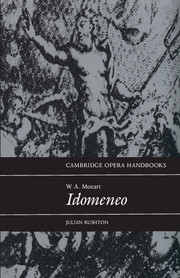Book contents
- Frontmatter
- Contents
- List of illustrations
- General preface
- Acknowledgements
- Introdution
- 1 Synopsis
- 2 Genesis of an operone
- 3 ‘Madame Dorothea Wendling is arcicontentissima’: the performers of Idomeneo
- 4 The genre of Idomeneo
- 5 From myth to libretto
- 6 Idomeneo after Mozart
- 7 General structure of Idomeneo
- 8 Two soliloquies
- 9 The musical language of Idomeneo
- 10 Tonality and motive
- 11 Elettra's first aria and the storm scene
- 12 Conclusions
- Notes
- Select bibliography
- Index
- Plate section
6 - Idomeneo after Mozart
Published online by Cambridge University Press: 05 June 2012
- Frontmatter
- Contents
- List of illustrations
- General preface
- Acknowledgements
- Introdution
- 1 Synopsis
- 2 Genesis of an operone
- 3 ‘Madame Dorothea Wendling is arcicontentissima’: the performers of Idomeneo
- 4 The genre of Idomeneo
- 5 From myth to libretto
- 6 Idomeneo after Mozart
- 7 General structure of Idomeneo
- 8 Two soliloquies
- 9 The musical language of Idomeneo
- 10 Tonality and motive
- 11 Elettra's first aria and the storm scene
- 12 Conclusions
- Notes
- Select bibliography
- Index
- Plate section
Summary
After the three Munich performances, Mozart tried to pave the way for a Viennese production by performing parts of Idomeneo at concerts. But the end of the National Singspiel and the engagement of an opera buffa troupe effectively barred the way to Idomeneo at the Burgtheater, whether in Italian or, as Mozart probably intended, in German. The single 1786 performance was in a private theatre; the first public Vienna production, which was in German, came only in 1806.
There seem to have been no performances of Idomeneo during the 1790s, but Mozart's posthumously growing fame led to a spate of publications, including plans for issuing his complete works. Three vocal scores of Idomeneo were published in 1797-8, and in 1800 the overture appeared in the popular domestic form of a piano duet. The full score was first published by Simrock in 1805 (entitled Idomeneo ossia Ilia ed Idamante). Other vocal scores appeared throughout the century, and in 1868 Breitkopf and Härtel initiated a series of operatic full scores with Idomeneo. International interest is evident from the publication of vocal scores in London and Paris in 1811, not apparently related to performances.
Most productions were in German, the first in 1802 at Kassel. Idomeneo's French origins are reflected in a strange production in Paris, described as with ‘words by M. Caigniez, arranged from the opera by Mozart by J. L. Bertin’, in 1822. The cast included confidantes for Idamante and Ilia, but Elettra disappears, her first aria being incongruously transferred to Ilia (Ilione).
- Type
- Chapter
- Information
- W. A. Mozart: Idomeneo , pp. 83 - 94Publisher: Cambridge University PressPrint publication year: 1993
- 2
- Cited by

